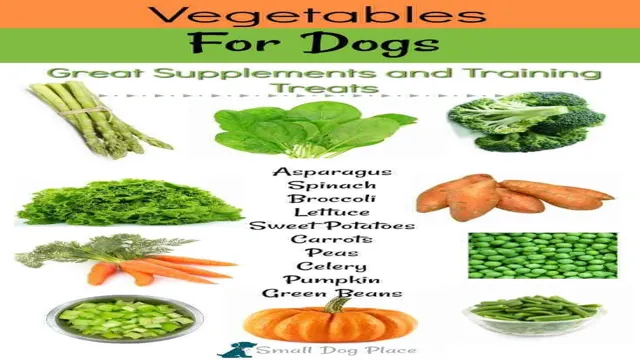Can Dogs Go Vegetarian? Exploring the Benefits of a Meat-Free Diet for Dogs

Providing your pup with a healthy and balanced diet is essential for their overall wellbeing. But can our furry friends enjoy a vegetarian diet, or do they need meat to survive? In this blog, we’ll look at the facts behind canine nutrition and answer the question: can dogs eat a vegetarian diet?
Benefits of a Vegetarian Diet for Dogs
In recent years, pet owners have become increasingly interested in vegetarian diets for their four-legged friends. While some pet owners may be concerned that a vegetarian diet would not provide their dogs with enough nutrients, the truth is that a vegetarian diet actually has a number of health benefits for dogs. Here are just a few of the benefits of a vegetarian diet for dogs. First and foremost, a vegetarian diet is much healthier for dogs than a traditional meat-based diet. A vegetarian diet is much lower in fat and cholesterol, which can help reduce the risk of obesity, heart disease, and other health issues.
Additionally, a vegetarian diet is also much higher in fiber, which can help improve digestion and help keep dogs feeling full for longer. Another benefit of a vegetarian diet for dogs is that it can help reduce the risk of certain types of cancer. Studies have shown that a vegetarian diet can reduce the risk of certain types of cancer, such as lymphoma and bladder cancer. Additionally, a vegetarian diet can also help reduce the risk of skin allergies and other sensitivities. Finally, a vegetarian diet for dogs can help reduce their environmental impact.
A vegetarian diet eliminates the need for the production of meat, which is a very energy-intensive process. Additionally, a vegetarian diet can help reduce the amount of water and land used to produce food for dogs. Overall, a vegetarian diet can offer a number of health benefits for dogs. It can help reduce the risk of obesity, heart disease, cancer, and other health issues. Additionally, a vegetarian diet can also help reduce the environmental impact of pet food production.
If you are considering switching your dog to a vegetarian diet, it is important to do your research and make sure that your dog’s nutritional needs are met.
Nutritional Advantages
A vegetarian diet for dogs can provide them with a plethora of nutritional advantages that cannot be found in traditional diets. Studies have shown that dogs who are fed a vegetarian diet have higher levels of antioxidants, which can help boost their immune systems and protect them against a range of illnesses. Vegetarian diets also tend to be composed of more plant-based proteins, which can help to keep joints healthy and provide a more balanced energy source for your pup. Additionally, a vegetarian diet may offer the benefit of helping to reduce the environmental footprint of your pet, as it requires fewer resources for production. Overall, a vegetarian diet is an excellent way to ensure that your four-legged friend is getting the essential nutrients they need to stay healthy and happy.

Environmental Benefits
It may come as a surprise to some, but the answer to the question “can dogs eat a vegetarian diet?” is a resounding yes! Not only is it possible for your pup to enjoy a vegetarian diet, but it can also have numerous environmental benefits. A vegetarian diet can help reduce the amount of land and resources needed to feed your pup, as well as cut down on carbon dioxide emissions that are produced by meat production. It can also reduce the amount of waste created by the meat industry, as well as help reduce the amount of water used to produce meat. In addition, a vegetarian diet can help keep your pup’s body in optimal health, as it can up their intake of essential vitamins and minerals while also reducing their risk of certain illnesses.
Health Benefits
We all know that dogs are naturally carnivorous, but sometimes due to certain dietary restrictions or nutritional needs, a vegetarian diet for our canine companions can be beneficial. A vegetarian diet for dogs can be a great way to provide them with all the necessary nutrients and vitamins they need to stay healthy and happy. Not only can it help them maintain a healthy weight, but it can also help reduce the risk of certain diseases and conditions, such as diabetes and obesity. Additionally, a vegetarian diet can also help promote better digestion and improve a dog’s overall health and well-being. With the right diet, a vegetarian diet for dogs can be a great way to keep them healthy and happy for years to come.
Risks of a Vegetarian Diet for Dogs
Vegetarian diets for pets have become increasingly popular in recent years as pet owners look for ways to provide their furry family members with a balanced and nutritious diet. While it is possible to provide a healthy vegetarian diet for dogs, there are some important risks to be aware of. A vegetarian diet can be beneficial for dogs, providing important nutrients like protein, carbohydrates, and vitamins. However, dogs have evolved to be carnivores, and their bodies require certain essential nutrients only found in animal sources. These nutrients are known as essential amino acids and include taurine, arginine, and lysine – all of which are found in meat.
Without these nutrients, dogs can suffer from health issues like weakened immune systems, vision problems, and heart disease. In addition to the health risks, a vegetarian diet for dogs can be difficult to maintain. It requires careful meal planning and supplementation to ensure that all the essential nutrients are included. This can be a challenge for busy pet owners who may lack the knowledge or the time to properly monitor their pet’s diet. Finally, dogs on vegetarian diets may be more prone to obesity and food allergies.
Since vegetarian diets are often high in carbohydrates, they can cause weight gain in some dogs. Additionally, food allergies can be triggered by the use of certain ingredients, such as wheat, soy, and corn, which are commonly used in vegetarian pet foods. Overall, vegetarian diets can have some benefits for dogs, but they also come with some risks. It’s important to carefully consider the pros and cons before making the switch, and to consult a vet if you have any questions or concerns.
Nutritional Deficiencies
A vegetarian diet is a great way to provide your dog with the nutrition they need to stay healthy and happy. However, it is important to understand that a vegetarian diet may not provide the same level of essential nutrients as a diet that includes meat. Dogs require certain essential amino acids, fatty acids, and minerals that are not present in a vegetarian diet. As such, it is important to ensure that your dog is receiving adequate nutrition from alternative sources if you choose to feed them a vegetarian diet. Through careful supplementation and meal planning, you can ensure that your dog is getting all of the necessary nutrients to stay healthy and fit.

Inadequate Protein Sources
Many pet owners wonder if their beloved canine friends can get enough protein from a vegetarian diet. The answer is yes, but it takes a little extra planning and knowledge. Canines are omnivores and can digest both plant and animal sources of protein. However, they do require certain amino acids to maintain a healthy diet, and these amino acids are found in higher concentrations in animal proteins. Therefore, a vegetarian diet for dogs must be carefully balanced to provide the right amount of protein and essential amino acids.
This can be done by adding in a variety of grains, legumes, and other plant-based proteins, along with nutritional supplements. With proper planning and supplementation, a vegetarian diet can be a healthy option for dogs.
Lack of Essential Vitamins
The health of our four-legged friends is of utmost importance, and it is no surprise that pet owners want to ensure that their pets receive all the essential vitamins and minerals they need to stay healthy. Unfortunately, dogs cannot sustain themselves solely on a vegetarian diet, as certain vitamins and minerals that are essential for their wellbeing cannot be obtained from plant-based sources. This means that it is important for pet owners to supplement their dogs’ diet with animal products, as they contain the necessary vitamins and minerals that are not found in plant-based foods. Ultimately, a vegetarian diet may not be the healthiest choice for a dog, as it lacks the essential vitamins and minerals that can only be found in animal-based products.
Conclusion
In conclusion, it is possible for dogs to eat a vegetarian diet, but it is not necessarily the best choice for the pet. Vegetarian diets for dogs are not always balanced and can lead to nutrient deficiencies. Therefore, it is better to consult a veterinarian before making any changes to your dog’s diet.”
FAQs
Can dogs eat vegetarian diet?
Yes, dogs can eat vegetarian diets, as long as the diet is carefully balanced with the correct amount of essential nutrients and vitamins.




